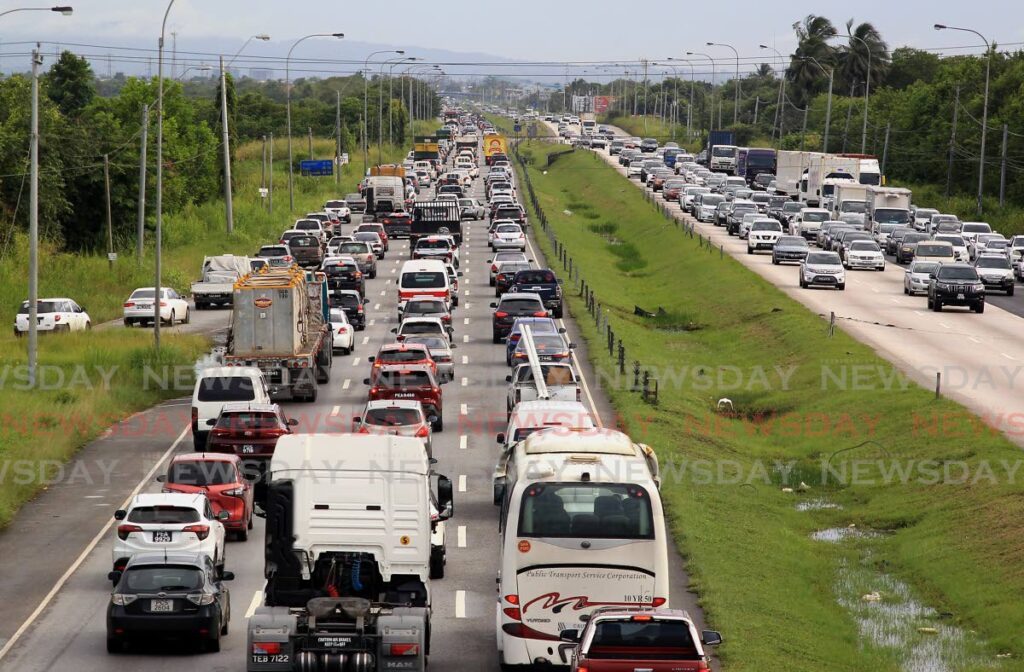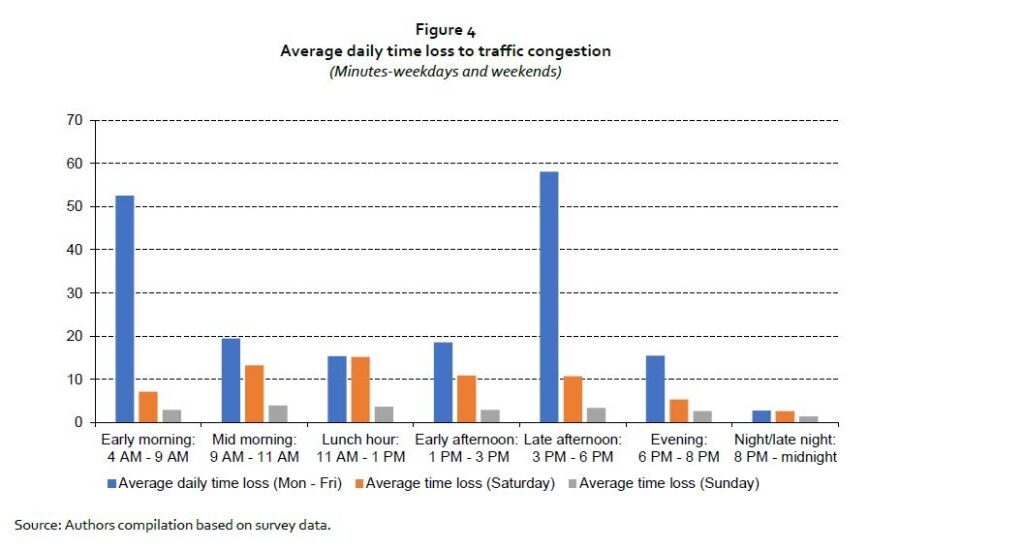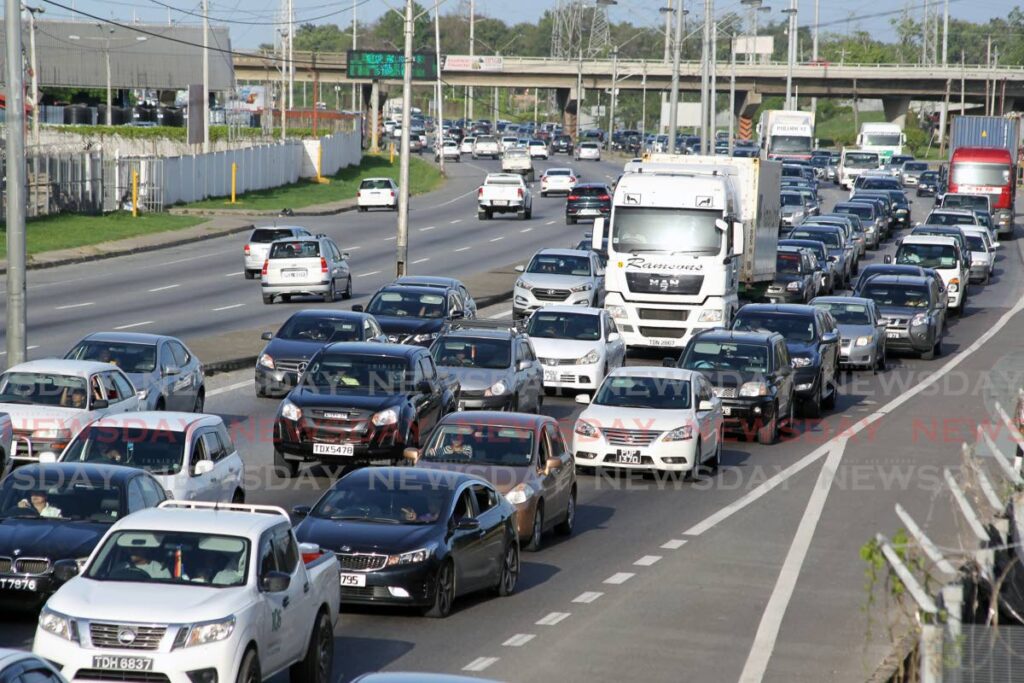Business groups, expert: No easy fix for $m traffic pain

WHILE there is no short-term fix for traffic congestion in Trinidad and Tobago, stakeholders say they are willing to offer solutions and work with the government to implement them.
The responses from supermarket owners, manufacturers and engineers, came following the recent release of a report by the UN Economic Commission for Latin America and the Caribbean (ECLAC).
It said the average person in Trinidad and Tobago spent an average of 110 minutes in traffic daily and over 33 days monthly which amounted to a staggering economic burden of $2.26 billion annually.
The report was based on 264 responses to a survey sent out to the commuting public.
Public Administration Minister Allyson West told Newsday that the report would be incorporated into the work-from-home policy currently being drafted.
“We appreciate that a lot of time is wasted in traffic. We are hoping we can come up with a policy that will not negatively impact productivity but will allow us to provide some kind of relief to the population at large in terms of the traffic problem.”
On Friday, the Public Administration Ministry announced accounting firm PriceWaterhouseCoopers had been hired to assist with the policy.
On January 23 she said, “The consultant is now starting their work and we are estimating they will need at least six months. So before the end of this fiscal is when we’re hoping to go public with whatever decision has been made in terms of the policy. We wrote to them to do their best to get it done as soon as possible.”
Supermarkets Association President Rajiv Diptee said while some people might think that deliveries to supermarkets contributed to traffic, the schedule was set by distributors and manufacturers.
“At the end of the day, supermarket warehouses are where goods are received off delivery trucks. There would need to be discussions at a couple of levels as if this is done in the evening or night, there are security considerations which are already very high during the day. There would also have to be discussions with the Labour Ministry regarding wages because you’d have people working very odd hours that now need special consideration, and how such remuneration would take place.”
He said other factors which contributed to congestion were too many cars, construction works, and accidents which create “macco traffic.”
“It frustrates a lot of the members because I could place an order with a supplier and it may take a couple to several hours to reach me, depending on the time of day I place the order. A pet peeve of mine is also long-bed construction trucks, which really should be moving around at a certain time. The traffic is less from supplier trucks than heavy equipment trucks.”
Diptee said there needed to be an expansion of alternate routes, as well as reliable public transport options. He said methods of getting the highest level of productivity needed to be considered.
Trinidad and Tobago Manufacturers' Association CEO Ramesh Ramdeen said the manufacturing sector was prepared to speak with relevant stakeholders to find solutions to the problem of traffic congestion.
“One suggestion of moving manufacturing fleets in the night or after working hours calls for other logistical issues to be in place such as optimal security measures to safeguard workers, having logistics and trade facilitation offices working round the clock, and for border agencies such as customs etc, need to be opened to facilitate trade.
“There is no easy fix to the problem by any one sector, especially the manufacturing sector whose fleet of vehicles represents less than 0.05 per cent of the vehicles on the road. The congestion on the road calls for a holistic approach, which allows, among other things, an improved road system, and possible staggering of working hours among other issues, but as indicated, this latter suggestion would need a rippling impact on other logistical issues to be put in place.”

Association of Professional Engineers of Trinidad and Tobago president Dr Trevor Townsend said there would be no easy fix to the problem of traffic congestion. He said while the association had issues with the methodology, he was happy that ECLAC had taken the opportunity to quantify the issue of traffic congestion. He said he hoped those in authority would use this as an opportunity to do a bigger study.
He said he classified congestion into three types: short-term, medium-term, and long-term.
“To fix short-term congestion, such as traffic caused by an accident, we need an adequately staffed and resourced transportation systems management organisation. The one we have isn’t adequately staffed and resourced. We need a functional transportation policy. We need decisions driven by the science of traffic engineering analysis, and it has to be applied. There has to be systematic collection and analysis over the years.
He said traffic control systems had to be properly designed and maintained, with traffic signal systems having proper timing, loops and actuation.
“We need adequate regulations and enforcement, particularly parking control, which we seem to have abandoned in most of our major cities.”
Townsend said medium-term congestion is what commuters encounter daily in travelling to and from work, home, and school.
“We need to shift our mode on the private corridors from private vehicles to higher occupancy vehicles so there can be more efficient use of the road space. You can’t build your way out of this kind of congestion. You will never be able to build or widen highways fast enough to cater for the continuous growth in private vehicles.”
He said there needs to be a shift in public transportation so that people would opt to use it.
“There needs to be an agency responsible for the overarching management, regulation and coordination of the sector. The Minister of Works and Transport can’t be responsible. The Public Transport Service Corporation is a bus-operating company, it doesn’t manage the public transportation system, of which it is a small player, as it does not carry the majority of the travelling public.”
He said there is a need for strategies, policies, and plans that govern that sector. He called for incentives for users of public transport.

“I would like to see a user-based subsidy, where the user can choose to use it for their preferred method of transport. We need budgetary allocations for more than highways and potholes, to create good infrastructure to improve the experience of public transport users. How you can encourage someone to leave their car (at home) if those using public transport are having bad experiences?”
Townsend said long-term congestion is caused by how land use and transport are interrelated.
“We normally talk about integrated land use transportation planning. There’s talk of a national transportation policy, but we suggest instead of having it run by the Ministry of Works and Transport, it should be administered under a national land use planning authority under the Ministry of Planning and Development Ministry.”
Townsend said if a consultant would be hired to draft the policy, this unit should be established and staffed with counterpart staff that could work with the consultant.
He said the ECLAC study brought to the fore the complete impact and wastage of traffic congestion in Trinidad and Tobago.
“We are glad to discuss this in the public domain and we need to take action now. There are no short-term solutions as the problem has been happening and growing, but we need to start now so we can create an improved transportation sector.”
Requests for information and comment from Transport Commissioner Clive Clarke and Works and Transport Minister Rohan Sinanan were unsuccessful up to press time.
What the report said
The report is titled Assessment of the economic costs of vehicle traffic congestion in the Caribbean: A case study of Trinidad and Tobago.
The average person spends 110 minutes a day, 16 hours a week, 64 hours or 2 days and 16 hours per month and 793 hours or 33 days per year in traffic.
A daily commuting population of 702,000 was used, of which 500 respondents were thought to be reasonable.
The survey was run for three months on Facebook, Instagram, LinkedIn and WhatsApp, shared with primary contacts, and to 4,000 people through the Trinidad and Tobago Unified Maxi-Taxi Association.
Participants were people who experienced traffic congestion either as a driver, as a commuter who utilised public transportation, or as a passenger who shared a ride in a private vehicle.
The average daily time delays for weekdays for various periods ranged from a low of three minutes for nights/late nights to a high of 58 minutes for late afternoons.
Most people said their daily activities were affected by traffic congestion, including social/family activities.
Many commuters also recognised the possible health-related impacts of long-term traffic congestion, including physical health, stress, and work productivity.


Comments
"Business groups, expert: No easy fix for $m traffic pain"